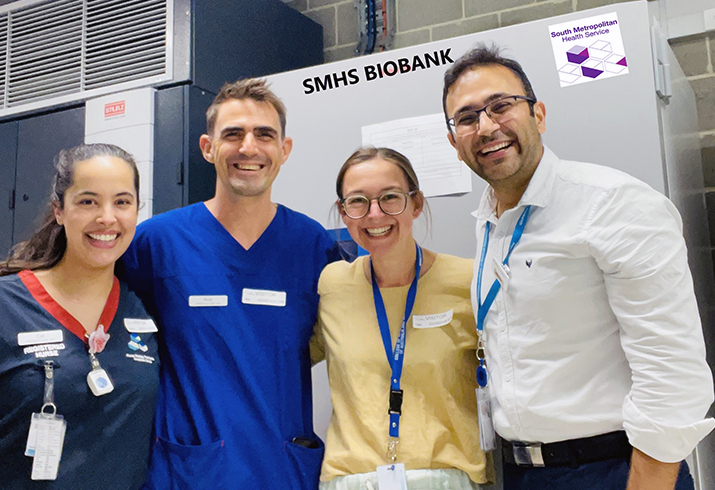Biobank enables better outcomes for critically ill patients
 FSH ICU Registered Nurse Catarina Wylde, FSH ICU Registered Nurse Nicholas Anthony, FSH ICU Registrar Dr Tess Evans, and SMHS Biobank Research Officer, Sheeraz Mohd.
FSH ICU Registered Nurse Catarina Wylde, FSH ICU Registered Nurse Nicholas Anthony, FSH ICU Registrar Dr Tess Evans, and SMHS Biobank Research Officer, Sheeraz Mohd.
South Metropolitan Health Service (SMHS) research can now utilise a wider variety of biospecimens, such as blood, body tissue or faecal matter, thanks to the SMHS Biobank – a newly-developed, world-class biospecimen sample processing and storage service.
The first of its kind in WA Health, the biobank assists researchers by processing and storing up to 20,000 samples at –80 degrees Celsius. The extreme low temperature maintains the integrity of samples, such as red blood cells for up to 10 years.
One of the first SMHS research projects to utilise the SMHS Biobank, the ICU Prospective Observational Embedded Microbiome Study, or POEMS, is underway.
POEMS aims to use faecal samples collected from Fiona Stanley Hospital (FSH) intensive care unit (ICU) patients to better understand how the gut microbiome changes in critically ill patients. POEMS will investigate how changes in gut bacteria can affect patients, lead to earlier identification of antibiotic-resistant bacteria and even help identify new treatments for critically ill patients in ICU.
FSH ICU Intensivist Professor Ed Litton, is leading the POEMS study alongside FSH ICU Registrar Dr Tess Evans. Ed explained that thanks to the biobank, this SMHS research will help improve outcomes for the most critically ill patients in health jurisdictions globally.
“Findings from previous studies investigating the gut microbiome of critically ill patients have been uncertain due to small numbers of samples,” Ed said.
“Thanks to the biobank, the POEMS research will include a world-leading sample size and enable a more robust clinical finding than ever before.
“ICU patients are highly vulnerable and despite rapid advancements in healthcare in recent years, we still urgently need new ways to provide timely diagnosis, prognosis and targeted treatment for critically ill patients – POEMS will help achieve this.”
SMHS Biobank Research Officer, Sheeraz Mohd, said POEMS is one of four research studies being piloted by the biobank.
“The biobank enables SMHS to undertake research with world-leading sample sizes and cutting-edge analytics,” Sheeraz said.
“These studies are the first of many, marking SMHS’s improved capacity to undertake more industry-leading research than ever, which will help improve patient outcomes for both our community and globally.”
The SMHS Biobank is located at the Harry Perkins Institute of Medical Research on the Fiona Stanley Hospital campus and is supported and operated in collaboration with PathWest.


